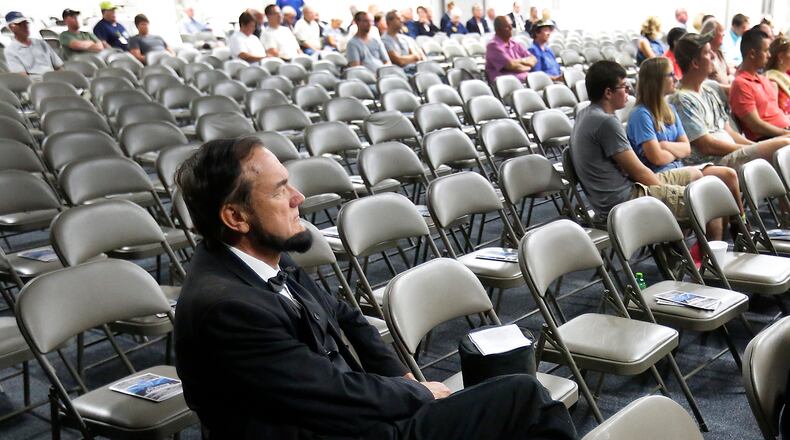But if the war was continued to achieve that principle, why was a Civil Rights movement primarily powered by the descendants of freed slaves required a full 100 years after war to guarantee that all black citizens could be allowed all a citizens’ most fundamental right: to vote?
The results of the war and its most remembered battle will on the agenda from 9 a.m. to 3 p.m. Saturday at the Clark County Heritage Center when the Clark County Historical Society presents its eighth Springfield Civil War Symposium.
Jared Peatman, the president of Four Score Consulting and a teacher at the George Washington University, and D. Scott Hartwig, who served for 20 years as the supervisory historian at the National Parks’ Gettysburg battle site, will address the battle at Gettysburg.
The period of Reconstruction that followed the war and is often the center of discussion on the failure of the nation to live up to its promise of equality will be addressed by Frank J. Williams, a retired chief justice of the Supreme Court of Rhode Island and a former president and chair of two of the most prestigious Civil War groups: The Abraham Lincoln Association and the Lincoln Forum.
In a telephone interview from Rhode Island, Williams agreed with the general notion that the post-war period of Reconstruction represents “a failed opportunity to cement and see through the results of the war.”
MORE: Springfield native, piano teacher known for lifelong learning dies
Reconstruction refers to the process by which the Southern states that had tried to secede from the nation were restored to the status of full statehood after the war. Williams said Lincoln held that secession was unconstitutional and that a state could not leave the union without the permission of the other states.
This was based on what he argued was the presumption of the U.S. Constitution and the Articles of Confederation before it anticipated: That from the time the compacts were formed, the separate states would be united as one.
Williams said the president’s position is based on common sense.
“Just think about it,” he said. “If you were allowed to secede willy-nilly, (after secession) what’s to prevent even the Confederate States from breaking up further? You’d have constant division until you only had satellites states. It really didn’t make sense.”
On the more lasting controversy of citizen equality, Williams said what momentum the war had created for greater equality ground to a halt during the disputed 1876 presidential election between Ohio Gov. Rutherford B. Hayes, a Republican, and New York Gov. Samuel Tilden, a Democrat. To resolve the disputed election, he said, the Republicans promised if Hayes were made president, federal troops occupying the South would return to their barracks and Southern states would be given freer rein in self-rule. Williams said that cleared the way for Jim Crow-era laws that stripped freed blacks of their essential rights and freed the Ku Klux Klan, a militia of the time, to re-impose a racist reign in the South.
MORE: Springfield News-Sun nominated for 11 awards
Williams also said, however, that it’s wrong to point the finger only at those involved in the election.
“The whole country was complicit,” he said, and the notion that the election itself was the “sellout” oversimplifies what happened.
Tom Taylor, professor of history at Wittenberg University, who has taught the history of Reconstruction since the 1970s, agreed that there were major issues afoot at the time competing with equality. One was the nation’s weariness of war and conflict and the desire to lay down both political and military arms. While some of the more radical Republicans of the North “want to use the opportunity (the Union victory presented) to push for an egalitarian society,” part of Lincoln’s war strategy was to reunify the nation as quickly as possible and leave the conflict in the past.
“He was more egalitarian as he lived longer,” Taylor said, “but the man who at Gettysburg said that all men are created equal “wasn’t one of the champions” of equality in the way that Ohio’s Benjamin Wade or Thaddeus Stevens, the Pennsylvania senator memorably portrayed in the movie “Lincoln” by actor Tommy Lee Jones.
Taylor said that Lincoln biographer David Herbert Donald described other factors involved in the retreat. One was party politics, which put equality on the back burner as the parties responded to their constituents’ worries over waves of immigration that were changing the nation. Another was our nation’s Constitutionalism, which, being tied to a text, made the nation less adaptable in addressing the nuanced world of racial politics than a parliamentary system.
Latest from Tom Stafford - Springfield News-Sun
A third issue was property rights. In an agricultural society, in which land is the key commodity, the most powerful way to promote equality is to redistribute land more equally. “Americans don’t like seizing land, even now,” Taylor said. Given that reality, he asked, “What would you do and how long would it take” to level the economic playing field in the post-war South?
Whatever the particulars, Williams says, the sesquicentennial of the war and now of Reconstruction present an opportunity for all to consider “why it failed” and what it will take “to get us back on track” to meeting the principle of the nation’s founding, which Lincoln echoed at Gettysburg.
When the symposium meets, two score and five years will have passed since Martin Luther King Jr. gave his “I Have a Dream“ speech on the 100th anniversary of the Emancipation Proclamation.
TOM STAFFORD’S BLACK HISTORY MONTH SERIES
Part 1: Cosby received grandma’s tough medicine during childhood
Part 2: Springfield woman overcame tough childhood
Part 3: Springfield woman overcame workplace barriers
Part 4: After 20 years, Springfield woman has prayers answered
How to go
What: 8th Springfield Civil War Symposium
When: 9 a.m. to 3 p.m. Saturday
Where: Clark County Heritage Center
Admission: Adults, $60; members, $50; students, $20
Contact: Clark County Historical Society, 324-0657
About the Author
